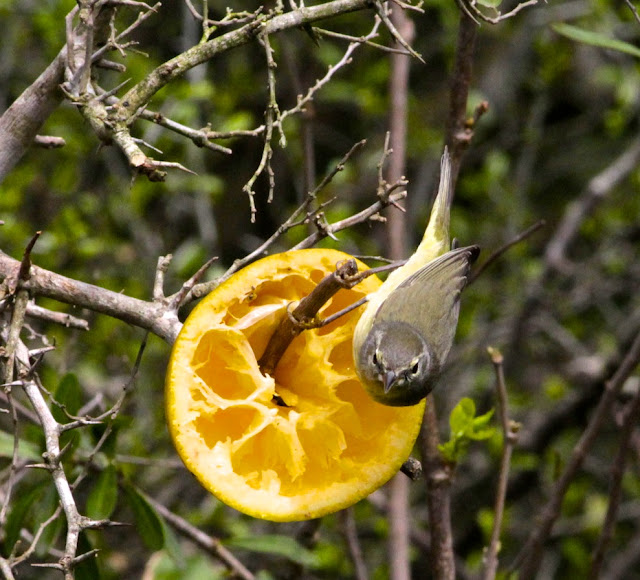This week in birds - #549
A roundup of the week's news of birds and the environment:
An Orange-crowned Warbler enjoys a taste of orange.*~*~*~*
"Murder hornets" have a (somewhat undeserved) fearsome reputation but would you recognize one if you saw it?
*~*~*~*
The iconic mountain lion known as P-22 no longer stalks the hills of Los Angeles but he lives on in the hearts of Angelenos.
*~*~*~*
Today is World Migratory Bird Day and all across the continent birds are on the move to their summer homes and that includes the smallest of them, the hummingbirds.
*~*~*~*
"Statistically impossible" heat waves are becoming more of the norm every year.
*~*~*~*
The profits of the four highest-polluting investor-owned companies in the world - Exxon, Chevron, Shell, and BP - are almost inconceivably large.
*~*~*~*
Many outdoor brands are phasing out "forever chemicals" in their products ahead of an expected ban of the substances.
*~*~*~*
*~*~*~*
Recent research indicates that it took three tries before Homo sapiens was able to supplant the Neanderthals in Europe.
*~*~*~*
*~*~*~*
Rex Brasher may indeed be the "greatest bird artist you never heard of."
*~*~*~*
Ecuador has come up with a record-setting plan to preserve and protect the Galápagos Islands.
*~*~*~*
What should you do if you are attacked by a swarm of bees?
*~*~*~*
The Greenland glacier is being eaten away by the warm tides stoked by global climate change.
*~*~*~*
A proposed liquefied natural gas plant in the Florida Panhandle poses a threat to the plans for development in a Black community there.
*~*~*~*
The unique pink river dolphins of the Amazon provide an early warning system for us in regard to the condition of the environment.
*~*~*~*
The destruction of some ancient trees in western Canada has highlighted the porous nature of the plans to protect the old-growth forest.
*~*~*~*
As I sit at my desk tonight, I can hear the frogs in my yard in their amphibian chorus, but are they singing at a higher pitch because of global warming? That I cannot tell.
*~*~*~*
Thanks to melting snowpack, Lake Powell is rising more than a foot a day but that will not be enough to repair the effects of the megadrought.
*~*~*~*
This is Chonk, a giant snapping turtle that lives in the Chicago River. As he is seen lounging by the waterside, his presence gives hope that the river may be becoming less polluted.




Thank you as always for the weekly roundup, Dorothy. I am a little pressed for time this morning, but I will return and go though it all later. I am especially interested to learn more about Rex Brasher, an artist who Is unknown to me, and I suspect to most people. Who knows, maybe one day we'll have Brasher Societies! All the best - David
ReplyDeleteFrom what I've read of Brasher this week, I think Nature societies named for him would be highly appropriate.
DeleteI don't think the western US could survive the snowpack it would take to repair the megadrought's effects on Lake Powell. There are too many hogs at the trough.
ReplyDeleteIndeed.
DeleteI can't even imagine the profits Big Oil made in the first quarter of this year. And the author of the article is right; we can't trust corporations to do the right thing.
ReplyDeleteThank you for sharing the newly discovered butterfly. We are slowly watching The Lord of the Rings, extended version, so I quite like the name chosen.
I like thinking that the same birds who I saw at Quintana a few weeks back and who were in my backyard might now be in Canada.
Ah, "The Lord of the Rings" - a story that has meant so much to me. I first read it when I was a teenager and I was enthralled. I reread it several times over the years and, of course, when the movies came out, I was ecstatic! I have seen them several times also. Maybe it's time to watch them again in honor of the butterfly!
Delete